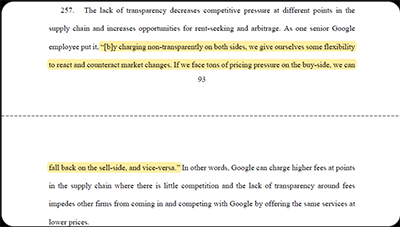 |
||||||||||
|
||||||||||
| Google Takes Double What Competition Takes For Ad Deals? |
 |
| Talk about inflating ad deals. In an unredacted lawsuit in the U.S. District Court of the Southern District of New York, it was discovered that Google takes between 22-42% of each ad transaction that moves through its system. This is anywhere between two and four times the amount rival ad exchanges take. In Q3 2018, the search giant served 75% of all ads seen on the internet and typically owns 80% of auctions on its exchange. |
| Everyone’s loss—the publishers, advertisers and the consumers—is Google’s gain. “The case argues that Google’s business practices inflate advertising costs, which brands pass on to consumers in higher priced products. It also alleges that Google suppresses competition from rival exchanges and limits websites’ options for ad delivery.” Sadly, the smaller the advertiser, the more they pay. Transactions fees on Google’s Display Network range from 32-40%. Google even sought to nip header bidding in the bud, the lawsuit claims, "through partnerships and software that protected its position. Google offered an alternative to header bidding that appeared to be a concession to the competitive pressure, but the suit says it secretly developed a program called ‘Jedi’ to ensure that Google’s exchange won auctions.” Google developed AMP—Accelerated Mobile Pages—to bring down header bidding. It designed AMP pages so they wouldn’t play nice with header bidding, causing ads to load with a one-second delay, a lifetime online. Texas Attorney General Ken Paxton said that Google’s internal communications show it can’t justify its ad fees. “Only a monopolist can charge rates that are double the rates of its competitors and yet still increase their market share.” Google’s parent company Alphabet has been given $10 billion in fines over the past few years, but the company is on track to rake in $70 billion in 2021. Not a drop in a bucket, but also not crippling by any means. The unredacted lawsuit explains the massive conflict of interest pertaining to Google’s ownership of buy-side and sell-side services. “Google owns the largest buy-side and sell-side brokers, one senior Google employee admitted in evidence gathered within the suit. The analogy would be if Goldman or Citibank owned the NYSE." "The American Choice and Innovation Online Act, recently introduced by Senators Chuck Grassley (R-IA) and Amy Klobuchar (D-MN), would free up competition for these small companies to compete with Big Tech monopolists like Google,” said Mike Davis, president of the conservative advocacy group the Internet Accountability Project. |
| Google, Facebook Worked Together Against Apple’s Privacy Plans |
| If having the lion’s share of ad share profits on lock wasn’t enough, Google and Facebook joined forces in an effort to sully the effectiveness of Apple’s privacy tools in Safari and continue tracking users. Part of a complaint notes that "Google and Facebook have been working together to improve Facebook's ability to recognize users using browsers with blocked cookies, on Apple devices, and on Apple's Safari Browser, thereby circumventing one Big Tech company's efforts to compete by offering users better privacy.” |
| The complaint looked further into Google’s Jedi, its code for its system that allowed them to send publishers’ open ad inventory to sell on multiple ad exchanges. “In reality, Google allegedly made it so its own exchange would win, despite higher bids from other exchanges, with the system apparently made to avoid competition.” “Google also apparently attempted to forestall and diminish child privacy protections in proposed regulations by the FTC." A document prepared in advance for a meeting between Google and other tech companies in August 2019 revealed there was a need for the search company to ‘rein in’ firms like Microsoft so they didn't compete on privacy.” This summer, when Apple launched App Tracking Transparency, users opted to not allow companies to track their online footprint. This has been harmful to companies like Facebook, which rely on that data to serve customers relevant ads. |
| How Apple’s Privacy Changes Affect Small Companies |
| Google and Facebook will still make gobs of money, even if they take a hit from Apple’s privacy changes. Those who see the negative side effects of updated privacy changes are smaller companies who throw massive budgets into Facebook advertising to reach relevant consumers. One example is Loose-leaf tea seller Plum Deluxe. Previously, it cost $27 on Facebook and Instagram ads to gain a new customer. Now, it takes the company $270 to pick up a new customer, an unsustainable number. And as expected, Apple's ATT is also being blamed for adversely impacting Facebook's revenue. According to MobileDevMemo's Eric Seufert, "ATT presented significant challenges, those challenges disproportionately were experienced by the gaming and ecommerce categories, and the magnitude of the challenges materialized on the higher end of the range expected by Facebook." |
| Advertisers cannot find and retain customers the way they used to, and certainly not at the previous level of CPA. If the cost per acquisition continues to increase, customers will be the ones feeling the effects when it comes time to purchase products. “Small businesses could launch their pajama websites and advertise on Facebook because Facebook could identify users who most likely would buy those pajamas based on their activity on the web,” said Nii Ahene, chief strategy officer at digital ad firm Tinuiti. “It has become a lot more challenging” for Facebook to do that. Flurry, a mobile app analytics company, found that U.S. customers op into tracking a mere 16% of the time under Apple’s new privacy prompts. “We don’t have the capital to weather that, said Cynthia Plotch, co-founder of Get Stix. We needed to pull back. Stix cut its Facebook ad spending by roughly half and shifted dollars to other types of ads, from TikTok to email marketing.” Alex Kantrowitz—of Big Technology—recently discussed Facebook’s reasoning behind the privacy war with Apple. “While no one wants to see two trillion-dollar companies having a knife fight, read the internal strategy document drafted by Facebook executives, we need to have this knife fight… Nobody wins in a knife fight, the old saying goes, but Cook seems to be the one drawing blood so far. His anti-tracking changes in iOS, which let people block apps from monitoring their browsing behavior across the web, dealt Facebook’s advertising business a significant blow.” “Apple’s policy is benefiting its bottom line at the expense of businesses, especially small businesses, who rely on personalized ads to reach customers and grow their operations,” a Facebook spokesperson told Kantrowitz. “We will continue to stand up for the businesses, creators and developers who are negatively impacted as a result of Apple.” |










